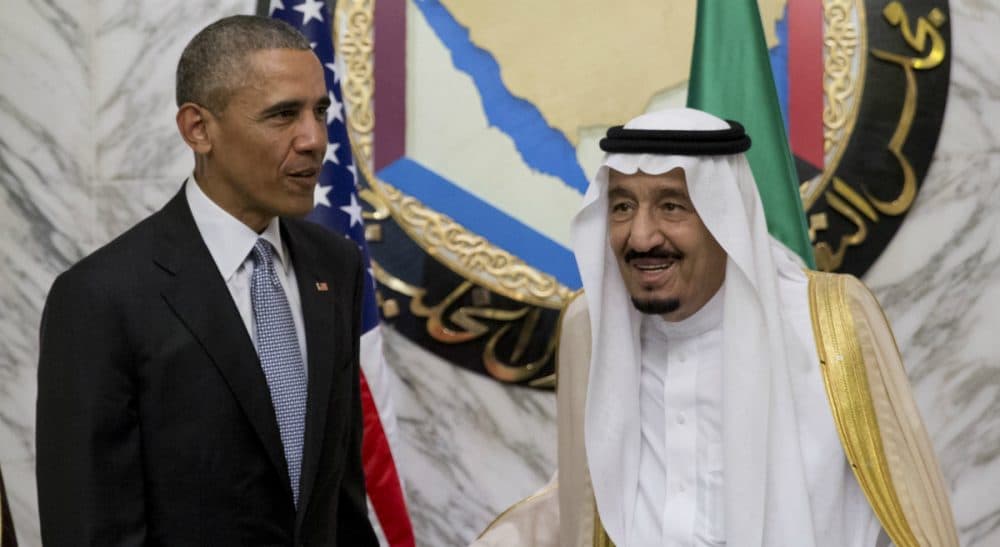Advertisement
Oil For Security? It's Time to Reevaluate America's Alliance With Saudi Arabia

President Obama visited Saudi King Salman last week to shore up a partnership that has always required some willful ignorance. As that relationship approaches a new low, the trade-offs necessary to sustain it are becoming harder to rationalize.
Saudi Arabia has long been a cornerstone in America’s Middle East strategy. Maintaining close relations, in addition to the free flow of Saudi oil, has required the United States to look past Saudi Arabia’s terrible human rights record at home and support for terror groups abroad.
A recent "60 Minutes" segment on the 28 pages of the 9/11 Commission Report that remain classified strained relations further. It featured an interview with former Sen. Bob Graham, who has seen the section and claims it points “a very strong finger at Saudi Arabia as being the principal financier” of the plot. Pressure on the Obama administration to make the section public increased, and on Sunday, Obama asked National Intelligence Director James Clapper to review them for possible declassification.
The tacit oil-for-security agreement that cemented relations between the two countries is eroding.
In addition, the Senate is considering a bill that would effectively permit victims of 9/11 to sue the Saudi government, which responded by threatening to sell off $750 billion of assets in the United States if the bill passes.
Some background: The Foreign Sovereignty Immunities Act of 1976 grants immunity to foreign governments in U.S. courts. There are exceptions for extrajudicial killing and torture. However, in 2009 the Supreme Court upheld the dismissal of a suit that sought damages from Saudi Arabia related to 9/11 under the torture exception.
The new bill would establish additional exceptions — including “providing material support or resources” which sounds a lot like Graham’s claims above. The Obama Administration has vowed to veto the bill because they believe it violates the very principle of sovereign immunity and could lead to reciprocal action against American citizens abroad.
With the president in Riyadh to smooth things over, one wonders: what is Obama working so hard to save?
The tacit oil-for-security agreement that cemented relations between the two countries is eroding. Fracking in the United States has reduced American dependence on foreign oil. Saudi Arabia has tried to force American oil out of the market by driving prices down.
To the security half of the equation, the Obama administration is calling on Saudi Arabia and other Gulf States to “step up” and contribute more to their own security. The Saudis, in turn, accuse focusing too much on ISIS while they’re engaged in an ongoing civil war in Yemen. The United States's nuclear deal with Iran — a Shiite country that many of the region’s Sunni countries see as a threat — added more tension.
To protect this relationship, the United States has prevented victims of 9/11 from achieving closure by redacting sections of the 9/11 report and prevented them from holding the Saudi government responsible, if Graham’s claims are true. The United States has looked the other way while the Saudi government has supported terrorism and flouted human rights. Maintaining this alliance no longer adds up.
So why not declassify the 9/11 papers? It could be that these classified pages or a lawsuit in court could reveal something that the government thinks the American people can’t handle. If they reveal that Saudi Arabia actively participated in 9/11, as Senator Graham claims, how would we respond? Remember, we invaded and overthrew the Afghan government for similar reasons. Promoting democracy and the rule of law abroad while failing to hold our allies (and, in this case, ourselves) to the same standard is troubling.
Maintaining this alliance no longer adds up.
For all of Obama's recent audacity -- concluding an unpopular agreement with Iran and reestablishing relations with Cuba -- this would have been a great opportunity for the outgoing president to reestablish control of the U.S. relationship with Saudi Arabia.
Instead, when announcing Obama would veto the 9/11 bill, press secretary Josh Earnest seemed more concerned with talking Saudi Arabia off the $750 billion ledge than addressing victim’s concerns. The carefully orchestrated meeting with the Saudi king had a distinctly conciliatory tone. Afterwards, Obama said “a lot of the strain was always overblown.”
Could it be that the value of an ally like Saudi Arabia in the Middle East was always overblown too?
